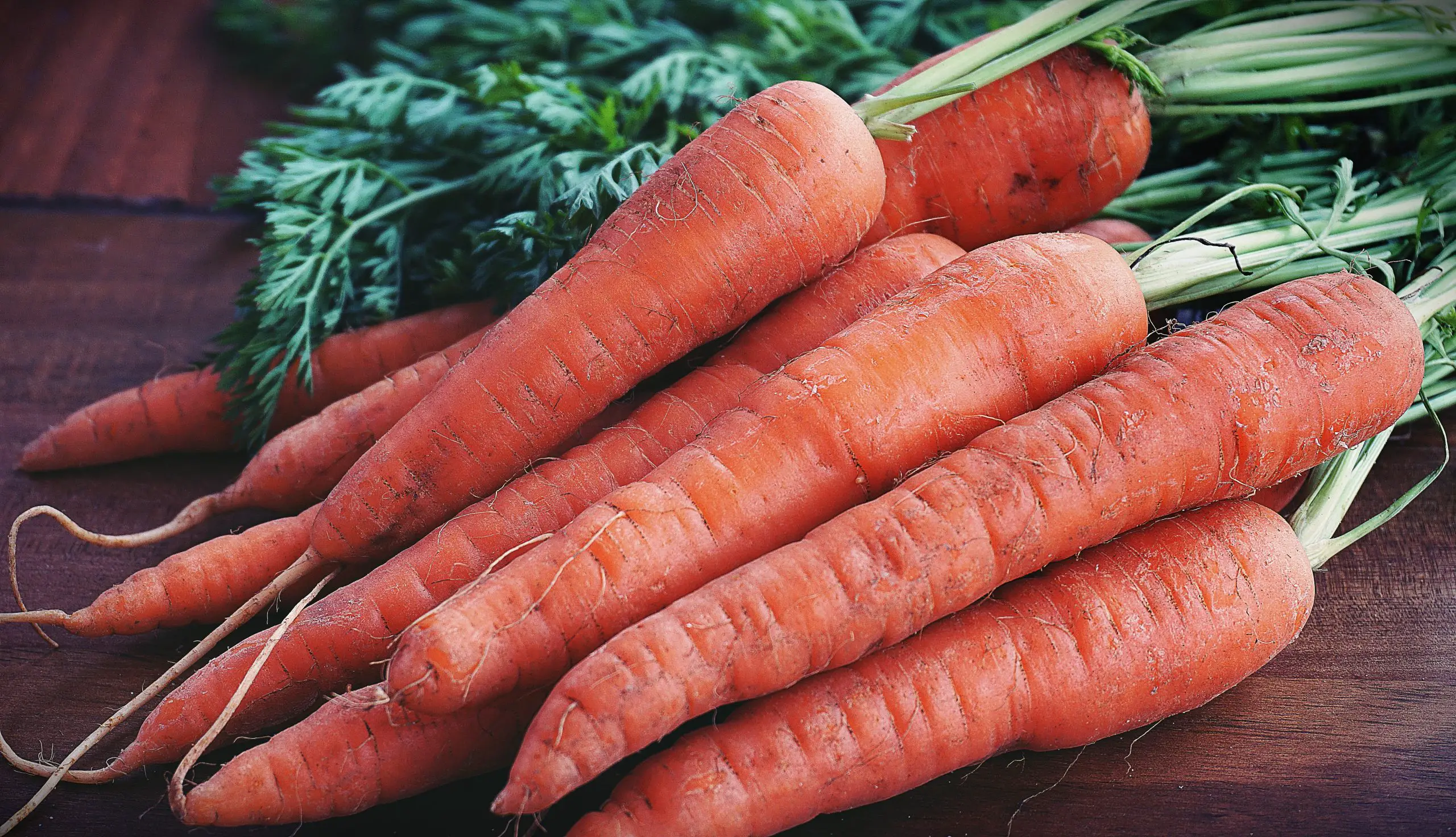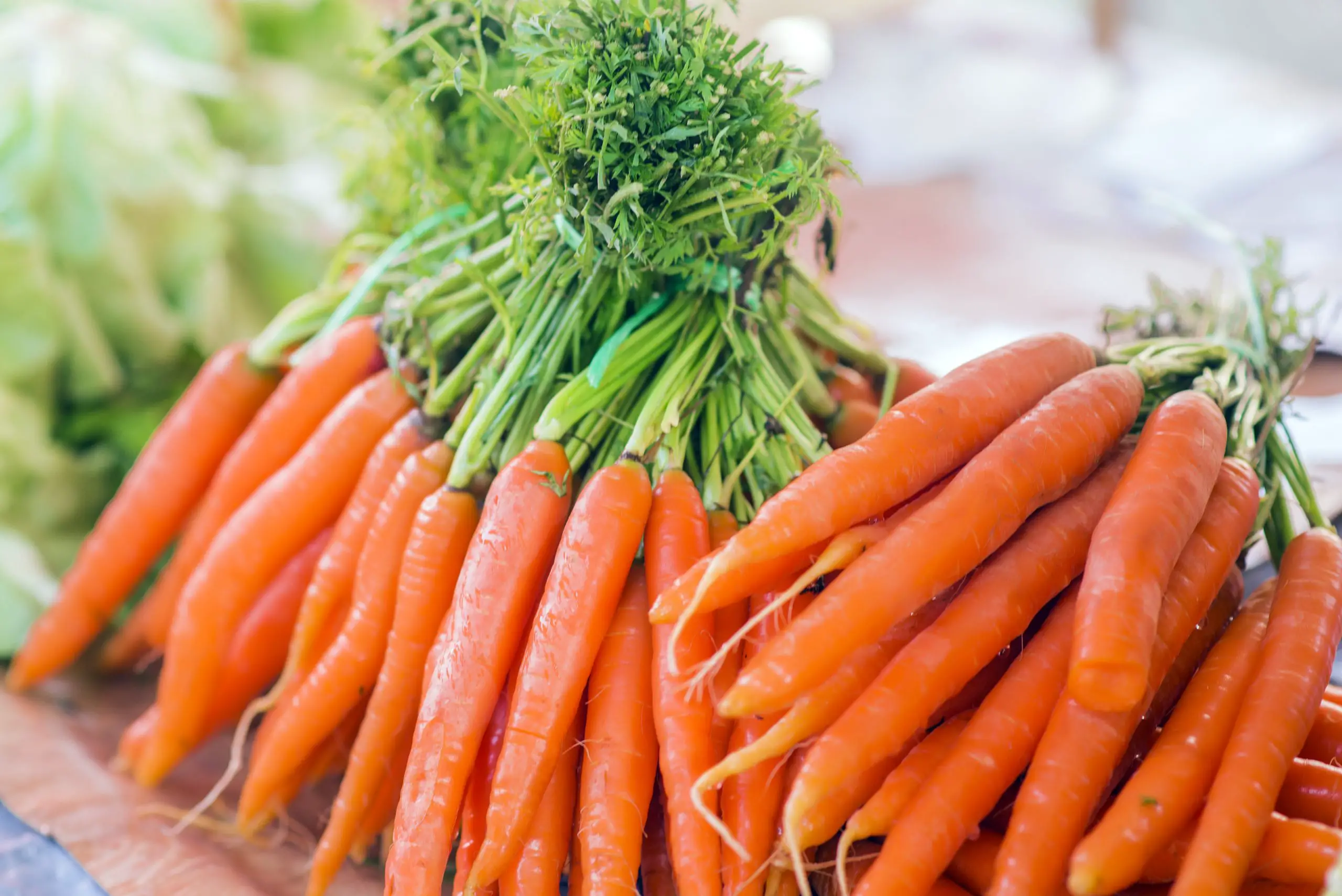You’re probably wondering how to freeze carrots. Here are a few pointers: To freeze carrots, cut them and blanch them to destroy any possibly hazardous bacteria before placing them in the freezer. You can also use a vacuum sealer or freezer bag. Place the carrots on a baking sheet lined with parchment paper after freezing. Fortunately, this is a simple process, and you’ll be ready to store carrots in no time!

Whether you have extra carrots that you have purchased or harvested and are looking for ways to preserve them, carrots can be frozen and then thawed again later for any reason. Learn how to freeze carrots to remain delicious even after being frozen properly.
How to Freeze Carrots?
Here Are Some Ways to Freeze Carrots:
Preparing the Carrots
Carrots can be frozen whole or peeled. If you opt to keep the skin, wash it thoroughly, preferably with a vegetable brush. Because carrots are typically softer after thawing, the peel is more difficult to remove when thawed.
This is why it is best to peel the carrots first, which means they can be utilized sooner, even after thawing. Because the peel of the root vegetables is essential as the foundation for any good stock, you can freeze the skin in a separate container to add to your stock.
Only carrots without dark stains should be utilized. Carrots become mushy owing to water retention and are substantially less delicious after thawing, which is unsightly. Carrots can be frozen whole, but it will take longer for them to defrost. On the other hand, carrots can still be cooked frozen in the saucepan and pureed.
Steps for Freezing Carrots
- Clean and peel the carrots well, or scrape them off with a knife. Then cut the two end pieces off. Unpeeled carrots can also be frozen. However, if you peel them ahead of time, you will save time afterward.
- You can cut the carrots into little slices if you choose. As a result, when you take them out of the freezer, you may prepare them immediately.
- Before freezing the carrots, blanch them, which disables particular enzymes, extending the shelf life. Place the carrots in a pot of unsalted boiling water for two to three minutes. Of course, you can freeze raw or undercooked carrots, but they won’t last as long.
- Meanwhile, fill another bowl halfway with ice water. Place the carrots in a bowl of ice water for two minutes. As a result, the carrots do not finish cooking and remain beautiful and crisp.
- If you have cut the carrots, set them on a level surface (such as a baking sheet) and place them in the freezer for about an hour to keep the portions from freezing.
- Freezer bags are frequently recommended as containers for frozen veggies. However, we recommend that you avoid it to save unnecessary plastic waste. Instead, resealable plastic jars can be used, which are simple to remove and can be used repeatedly.
- For plastic-free freezing, you can alternatively use thick-walled glasses or cotton sacks. Overfilling the jars will cause them to burst.
The frozen carrots can be stored for up to nine months in the freezer.
Freeze Raw Or Blanched Carrots
The raw root veggies can be frozen after being placed in a freezer bag if you want it to be quick. The color of the peeled carrots frequently dwindles and seems a bit less tasty after being thawed due to the reaction with oxygen and water.
This is not a major issue if you carry on cooking after that. It is better to blanch carrots in advance than to freeze them uncooked. This quick-cooking process can increase the carrots’ shelf life in freezing climates by a few months. They also maintain their vibrant orange color without losing any of the nutrients. A saucepan of unsalted water is heated to a rolling boil for blanching.
Carrot pieces are partially cooked for two to four minutes, depending on their size. The carrots shouldn’t be cooked until mushy; this heating should only be considered preparation. The carrot chunks are immediately in a bowl with cold water and ice cubes.
This guarantees that they stop cooking and maintain their color and consistency. The carrots can now be placed in a freezer bag or a plastic container.
You can set the pieces separately on a tray or large plate and freeze them in the freezer if you don’t want them to freeze together.
The carrots can be combined with other ingredients and placed in a bag after one to two hours. While raw carrots can be kept in the freezer for around three months, they can last up to nine months after blanching.
Tips
Here are some tips to freeze carrots:
Blanching Carrots before Freezing
It would help if you did not peel cooked carrots before freezing them. Instead, cut them into half-inch coins and place them in the boiling water. When soft, remove them with a slotted spoon and place them in a bowl of icy water. After they’ve cooled, rinse them and place them in a zip-top bag or vacuum-sealed plastic bag. They’ll keep for up to 9 months, and you may freeze a batch to use later.
Peeling Carrots is Optional
Carrots can be peeled before freezing, but it is not required, and it is recommended only to wash those used in recipes. Clean carrots store well in the refrigerator, and warm water and dish detergent are required. You can also purchase a vegetable wash. Thoroughly rinse carrots by rubbing their outer surface with your hands.
Keeping Frozen Carrots in Freezer Bags
To effectively preserve frozen carrots, use freezer bags. These plastic liners are simple to clean and can be reused multiple times. There are, however, alternative options. Reusable glass jars, cotton bags, or thick-walled glasses can also be used. Carrots can be frozen and kept fresh for up to nine months. However, keep in mind that freezer bags are frequently overfilled.
Using Freezer Divisions to Lower the Risk of Freezer Burn
While the presence of frost on frozen food is unpleasant, it does not necessarily indicate that it should be discarded. This type of food is not dangerous and will not cause foodborne illness. You should, however, avoid utilizing frozen food with a lot of freezer burn, which is caused by moisture loss. Employing freezer compartments may considerably lessen the likelihood of having this problem.
When freezing fruits and vegetables, remember that the longer you store them, the more likely they will suffer freezer burn. Frozen foods lose moisture; they become tough, discolored, and unappealing. Frozen meals can have a horrible flavor in addition to a lousy texture.
Uses for Frozen Carrots
Having a large supply of frozen carrots makes preparing them for hot recipes much easier. Carrots are the only vegetable that everyone in my family eats. As a result, I aim to incorporate it as a side dish in most meals.
Freeze the carrots until you’re ready to cook them. To utilize frozen carrots, reach into the bag, grab what you need, and cook as desired.
Boiled Carrots: Put the frozen carrots in a small pot, cover with water, and bring to a boil over medium-high heat. Cook for 6 minutes, or until soft, and season with salt, pepper, and butter.
Oven Roasted Carrots: Frozen carrots are a terrific way to save time when creating oven-roasted vegetables. Try the following recipe: Root Vegetables with a Rustic Roast.
Soups and Stews: Frozen carrots can also be used to make beef stew and soups. Because the carrots are half cooked, add them at the end and heat them until soft.
Health Benefits of Carrots
Carrots are root vegetable that is both inexpensive and versatile. They are high in beta-carotene and have been linked to improved cardiovascular health and cancer prevention in studies.
While carrots can be stored in the refrigerator for several weeks, they will not survive forever. Instead of throwing away your extra carrots, consider freezing them! When frozen carrots are properly prepared, they can survive for several months.
How Should Long Carrots be Blanched?
According to the National Center for Home Food Preservation, diced or sliced carrots should be blanched for 2 minutes. Blanch small, whole carrots (such as baby carrots) for 5 minutes.
Blanching is the process of briefly cooking food in boiling water before immediately plunging it into freezing water to stop the cooking. This method aids in the preservation of vegetable quality, texture, color, and nutrients.
Can Raw Carrots be Frozen?
You certainly can. They won’t last as long, but if you’re short on time, you may skip the blanching step and freeze raw carrots instead. For the greatest quality, utilize them within three months, and the flavor and quality decline after that. If you don’t blanch your carrots, make sure to rinse and peel them before freezing them, then boil them before eating to destroy any bacteria that may be present.
Blanch your carrots before freezing them to make them last longer in the freezer. Carrots that have been blanched, wrapped, and frozen properly will keep their quality for about a year.
Can Cooked Carrots be Freeze?
Carrots that have been roasted, sautéed, mashed, or added to soups can be frozen. Fill freezer bags or containers with these preparations, leaving a few inches of room to allow for freezing expansion. The majority of recipes can be frozen for up to three months.
How Long do Carrots Last?
Carrots can be stored in a cool root cellar for up to six months. If you don’t have a root cellar, don’t worry: Carrots may be preserved in the refrigerator for up to three weeks if submerged in water. Remember that these are only estimates—your carrots may keep longer or go bad depending on the variety when they were harvested and the climate in your fridge or cellar.
Carrots soften due to moisture loss if not properly stored, but you can still consume them as long as they’re not sticky. Use tender carrots in soups or stews because they have more flavor and cook faster. To bring squishy carrots back to life, immerse them in an ice-water bath to crisp them up.
Conclusion
Carrots can be frozen raw or blanched without issue. However, it should be noted that the carrots’ consistency changes significantly when frozen, depending on the thickness and time of storage. Thawed carrots are typically softer than raw carrots. As a result, they are not good as raw carrot sticks, but they are ideal for stewing or boiling.
Grated carrots can be frozen in groups to conserve space. However, they will gather water after thawing, which is why they collapse a little and lose some of their freshness. They might no longer be good for a raw carrot salad in this situation, but they are excellent for further processing into puree or soups.

